 Nitric Oxide Benefits and How to Increase Levels
Nitric Oxide Benefits and How to Increase Levels
High blood pressure? Erectile dysfunction? Fatigue? Insomnia? Inflammation? You may need nitric oxide in your life. Nitric oxide is a powerful mediator in cell-to-cell communication and plays an essential function in various bodily processes, including inflammation, neurotransmission, and validation. It may help to improve your health in various ways.
In this article, you will learn what nitric oxide is. You will learn about the signs and symptoms of poor nitric oxide levels. I will go over the different forms of nitric oxide. You will learn about the benefits of nitric oxide. You will understand the causes of low nitric oxide. I will share my top strategies to increase your nitric oxide levels naturally. Let’s get into it.
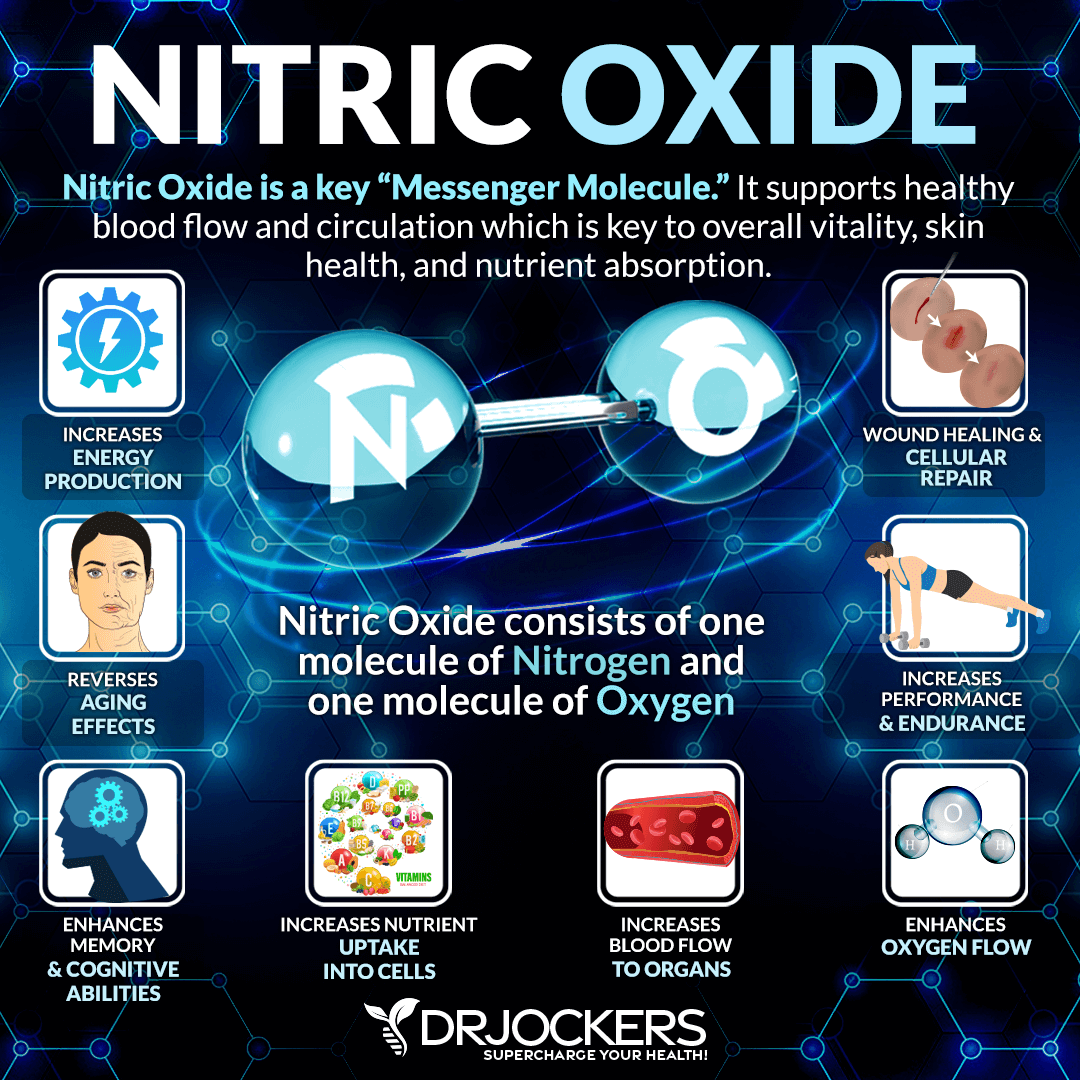
What is Nitric Oxide
Nitric oxide (NO) is a mix of gasses that are made up of nitrogen and oxygen (1). It plays a role as a mediator in cell-to-cell communication. It also plays an essential function in various bodily processes, including inflammation, neurotransmission, and validation.
NO is actually one of the most important molecules for your blood vessels and their health. Vasodilation refers to the widening of your blood vessels when the muscular walls of the vessels get relaxed. NO has an important part in the vasodilation process.
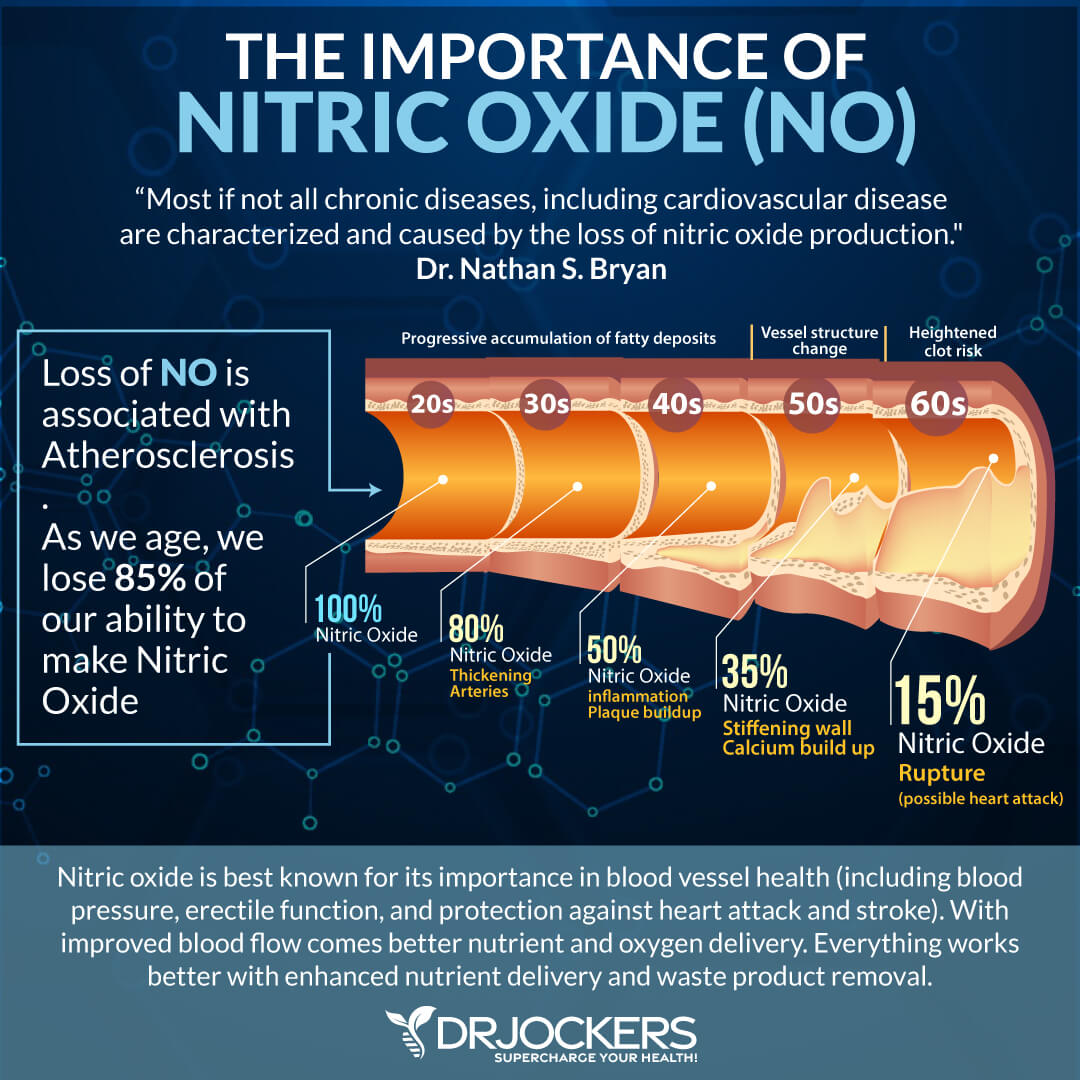
Signs and Symptoms of Poor Nitric Oxide Levels
Signs and symptoms of poor nitric oxide levels may include:
- High Blood Pressure
- Poor Healing and Recovery
- Depression and Anxiety
- Fatigue
- Erectile Dysfunction or Loss of Libido
- Poor Memory and Cognition
- Cold Hands & Feet
- Poor Vision and Eye Health
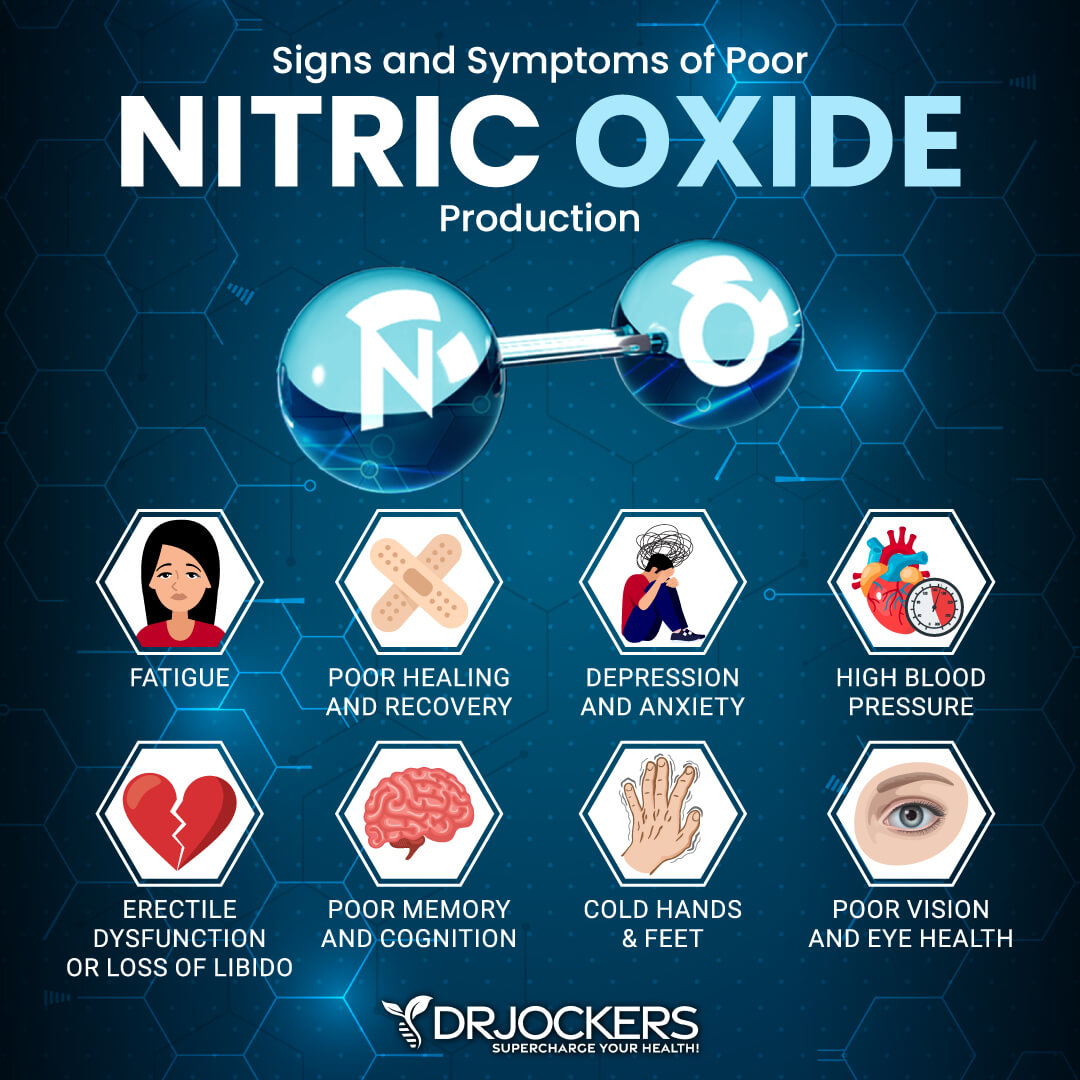
Different Forms of Nitric Oxide
There are three different forms of nitric oxide: neuronal, endothelial, and inducible.
Neuronal
Neuronal nitric oxide or neuronal NOS, also known as nNOS or NOS1, is one of the main forms of nitric oxide. It is constitutively expressed. It is an enzyme that plays a role in the synthesis of NO by neurons. This form plays a role in the homeostasis of the cardiovascular system and vascular function within the vascular endothelium (2).
Endothelial
Endothelial nitric oxide or endothelial NOS, also known as eNOS or NOS 3, is another of the main forms of NO. Just like neuronal NOS, it is constitutively expressed. This form is the main isoform that’s involved in vascular function and the lymphatic system.
It may support mediating endothelium-dependent relaxation and may reduce platelet aggregation. It also makes hydrogen peroxide (H2O2) and superoxide (O∙−2), which serve as mediators in non-neuronal cell signaling (2).
Inducible
Inducible nitric oxide or inducible NOS, also known as iNOS or NOS 2, is the third form of nitric oxide (2). Unlike its counterparts, inducible nitric oxide is actually a harmful enzyme. It may be one of the main contributors to health conditions affecting the cardiovascular system, including atherosclerosis (3).
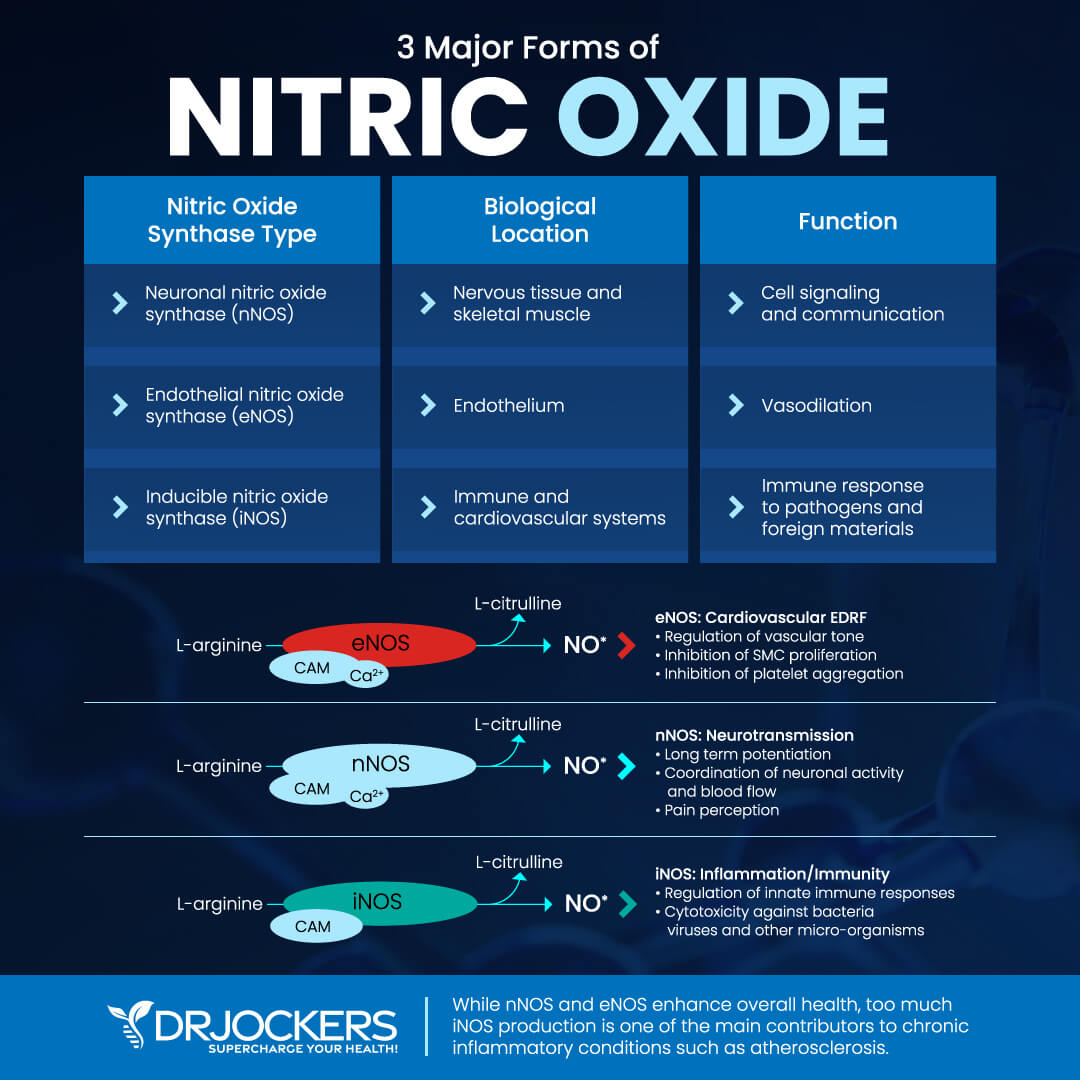
Health Benefits of Nitric Oxide
Nitric oxide has many health benefits. Let’s go over it:
Improves Blood Pressure and Endothelial Function
Nitric oxide is a powerful vasodilator. Being a vasodilator means that it supports blood movements through your blood vessels, making your heart’s job easier, so it doesn’t have to pump blood too hard. This vasodilating action can help to reduce your blood pressure. According to a 2013 review published in Nutritional Research Reviews, taking nitric oxide through a diet may help to improve the production of nitric oxide and decrease blood pressure (4).
Moreover, NO may also help to improve endothelial function. Endothelial function refers to the function of the endothelium, which is a thin layer of cells that line your blood vessels, heart, and other body cavities. Endothelial dysfunction may increase the risk of atherosclerosis, heart disease, heart attacks, and strokes.
According to a 2014 study published in the Journal of Clinical Hypertension, only one dose of oral NO supplement may help to reduce blood pressure, boost vascular compliance, and improve endothelial function in those with high blood pressure (5).
Finally, NO may also help to make your blood platelets less sticky and, as a result, decrease the risk of blood clots. According to a 2015 research published in Nitric Oxide, nitric oxide may help to decrease the rate of blood clot formation and the strength of the blood clots (6). This is important since blood clots can lead to heart attacks and strokes.
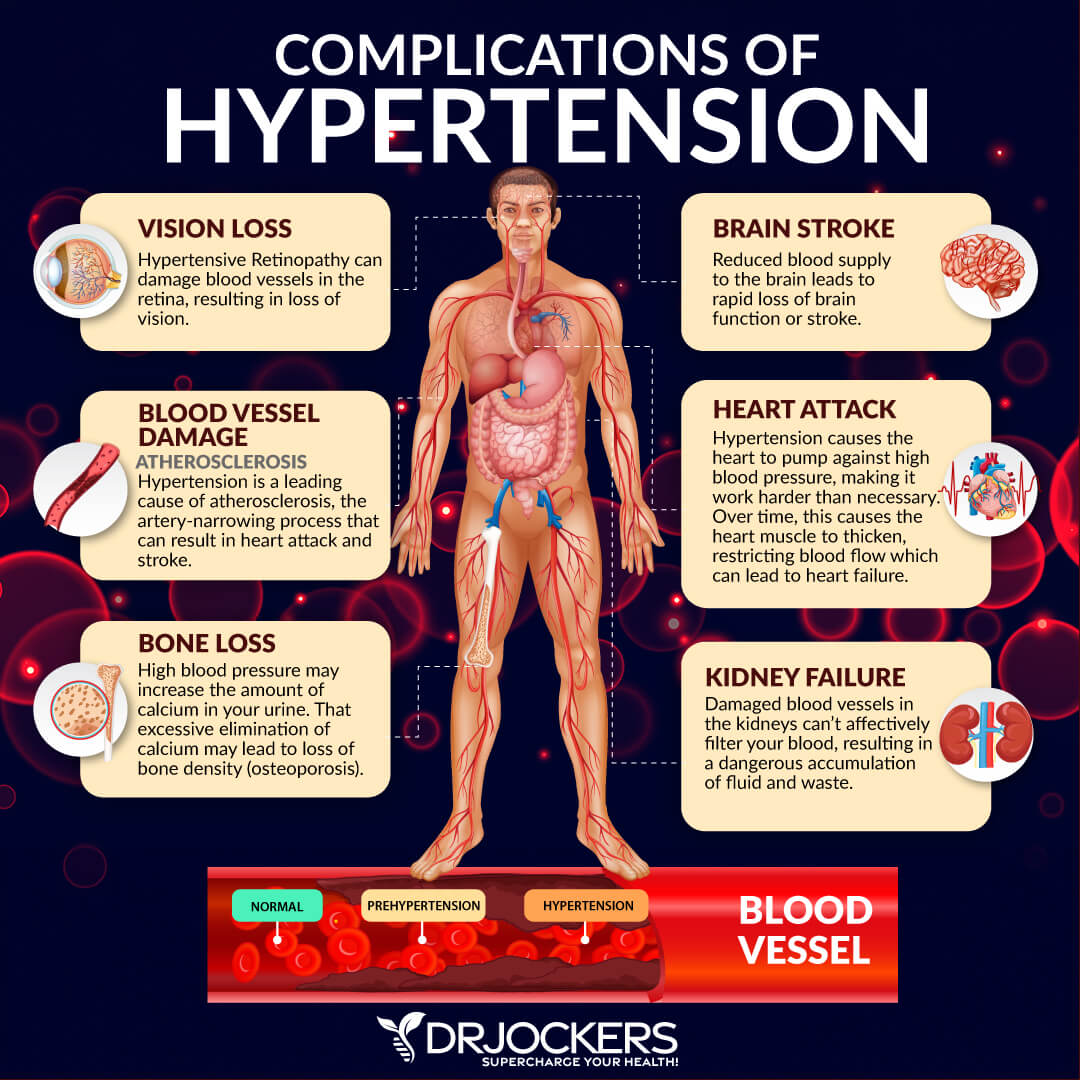
Supports Brain Health and Cognition
NO is also critical for your brain health and cognition. It serves as a messenger within your organ system. It serves a particularly crucial role within your central nervous system (CNS). In your CNS, nitric oxide serves as an intermediary in cellular communication.
According to a 2008 study at the University of Leicester, nitric oxide has the ability to change the computational ability of the brain (7). This means that it can help to reduce the risk or progression of neurodegeneration conditions, such as Alzheimer’s disease. According to a 2015 study published in Functional Neurology, a reduction in NO levels may increase the risk and worsen the progression of Alzheimer’s disease and other neurodegenerative diseases (8).
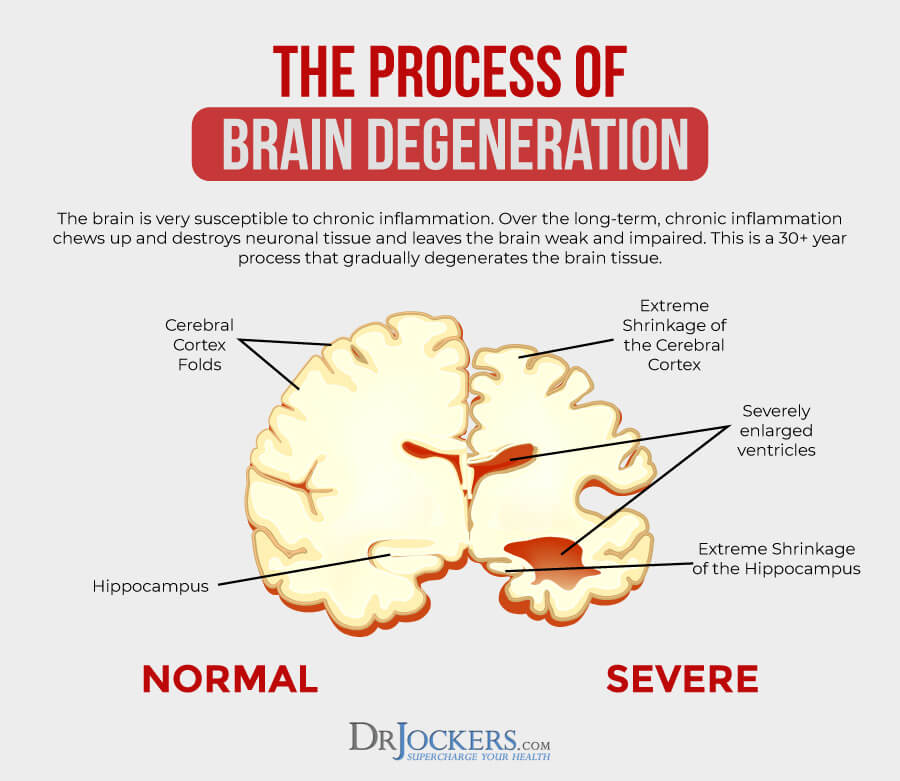
Improves Libido and Erectile Function
Nitric oxide is also essential for sexual function. According to a 2000 research published in the International Journal of Impotence Research, it is a major mediator for penile erection (7). According to a 2015 study published in Future Science OA, nitric oxide helps to relax the smooth muscle in the penis and increase blood flow, which is necessary for experiencing and maintaining an erection (8).
With age, however, NO synthesis reduces, which is essential for the production of both nitric oxide and L-arginine. This decrease leads to a reduced level of erectile response and can cause erectile dysfunction. High blood pressure may also be linked to erectile dysfunction. Since nitric oxide may help to reduce blood pressure, this may also help to reduce the risk of erectile dysfunction.
Lastly, NO may also help to improve libido — not just in men. According to a 2008 study published in the Journal of Sexual Medicine, NO may also help to improve sexual arousal in women (9).
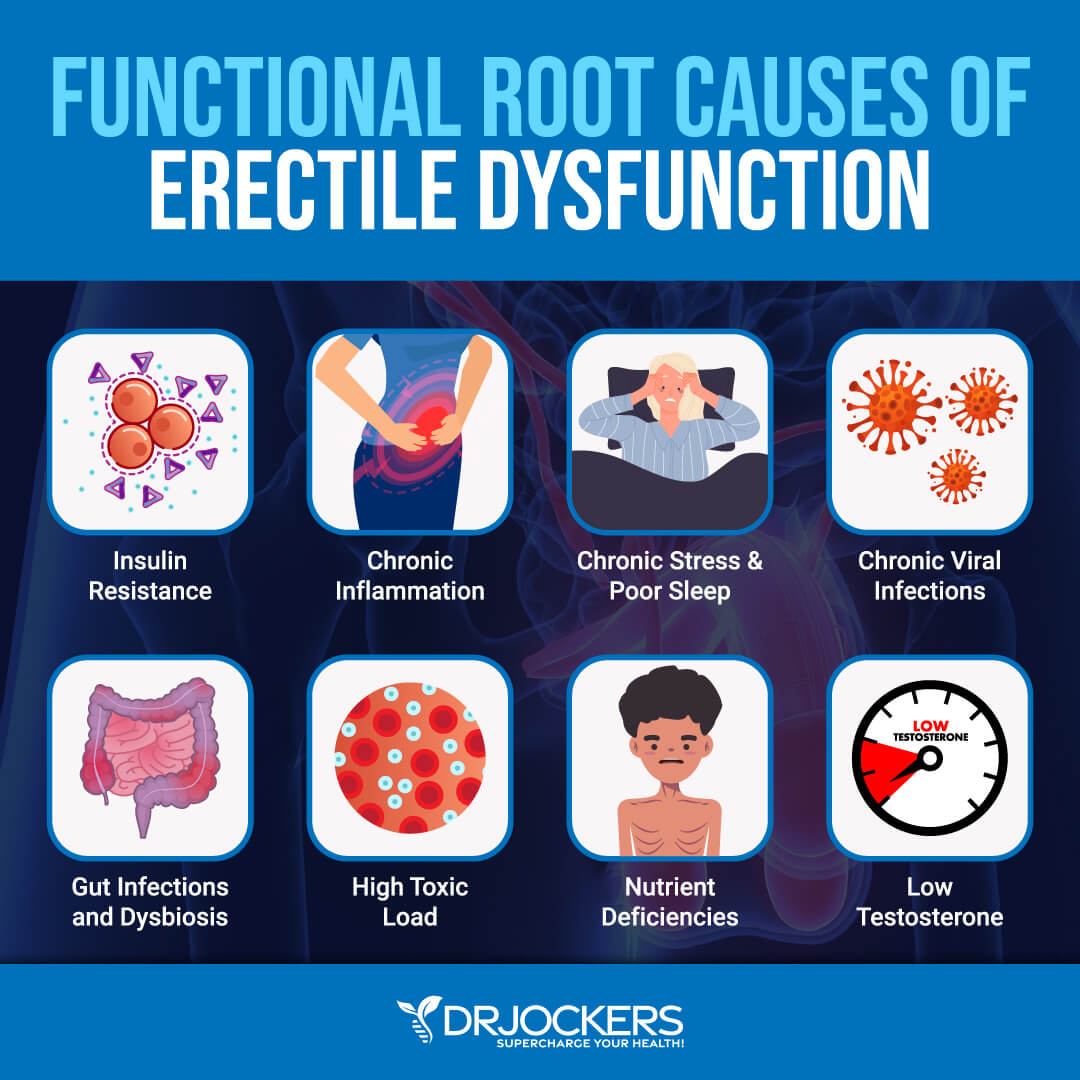
Supports Immune Function
Nitric oxide may also benefit your immune function. Your immune cell can make NO and also respond to it. This helps your body to reduce the risk of and fight infections and diseases.
According to a 2007 study published in the Indian Journal of Biochemistry and Biophysics, NO may serve as a toxic defense molecule that can help to fight any infection-carrying microorganism (10). Activated macrophages are a type of immune cell. They release nitric oxide and other compounds to stop pathogen replication and fight infections.
Improves Athletic Performance
Nitric oxide may also help to improve athletic performance. It may also help to help bodybuilders in building muscles. It’s no surprise that bodybuilders and other athletes often take NO before working out to support strength and endurance: better, harder, and longer workouts. It may be beneficial even if you are not an athlete, only a weekend warrior, workout moderately, or are new to exercise.
According to a 2012 review published in Sports Medicine, NO may help to increase tolerance to both anaerobic and aerobic workouts and support both moderately trained and untrained individuals (11).
According to the review, most research has been done on young men. This means that while we know the benefits of NO for men, we don’t have enough evidence to know if it helps women and older individuals. More research is needed on the subject.
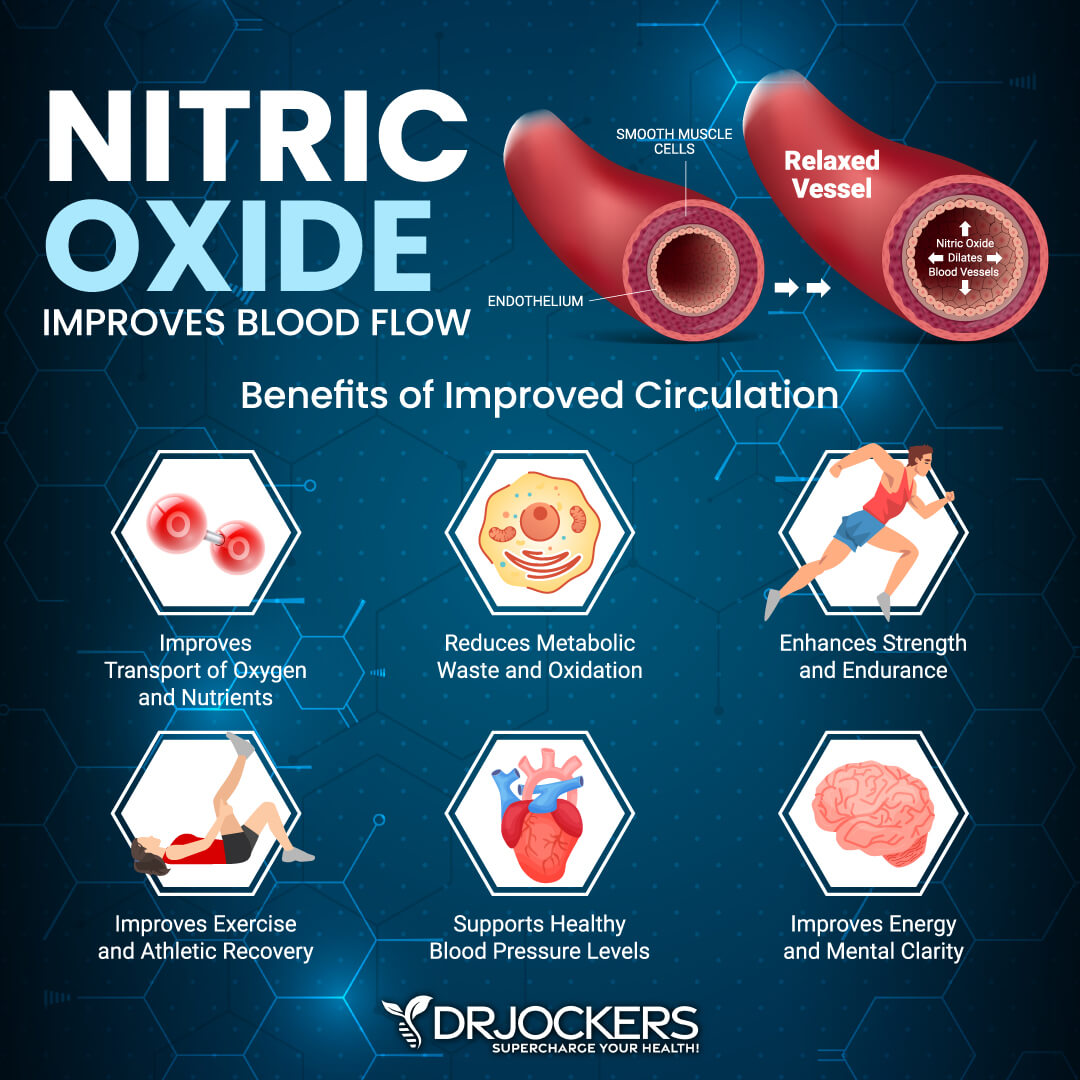
Causes of Low Nitric Oxide Levels
You may develop nitric oxide deficiency or lower than normal levels of nitric oxide if your body cannot make sufficient amounts of nitric oxide to support the bodily functions it needs. Low nitric oxide levels may develop for a variety of reasons, including:
- Aging
- Smoking
- Poor diet
- Nutrient deficiencies, including low levels of vitamin D and B vitamin
- Insulin resistance
- Chronic inflammation
- Lack of exercise
- Poor sleep
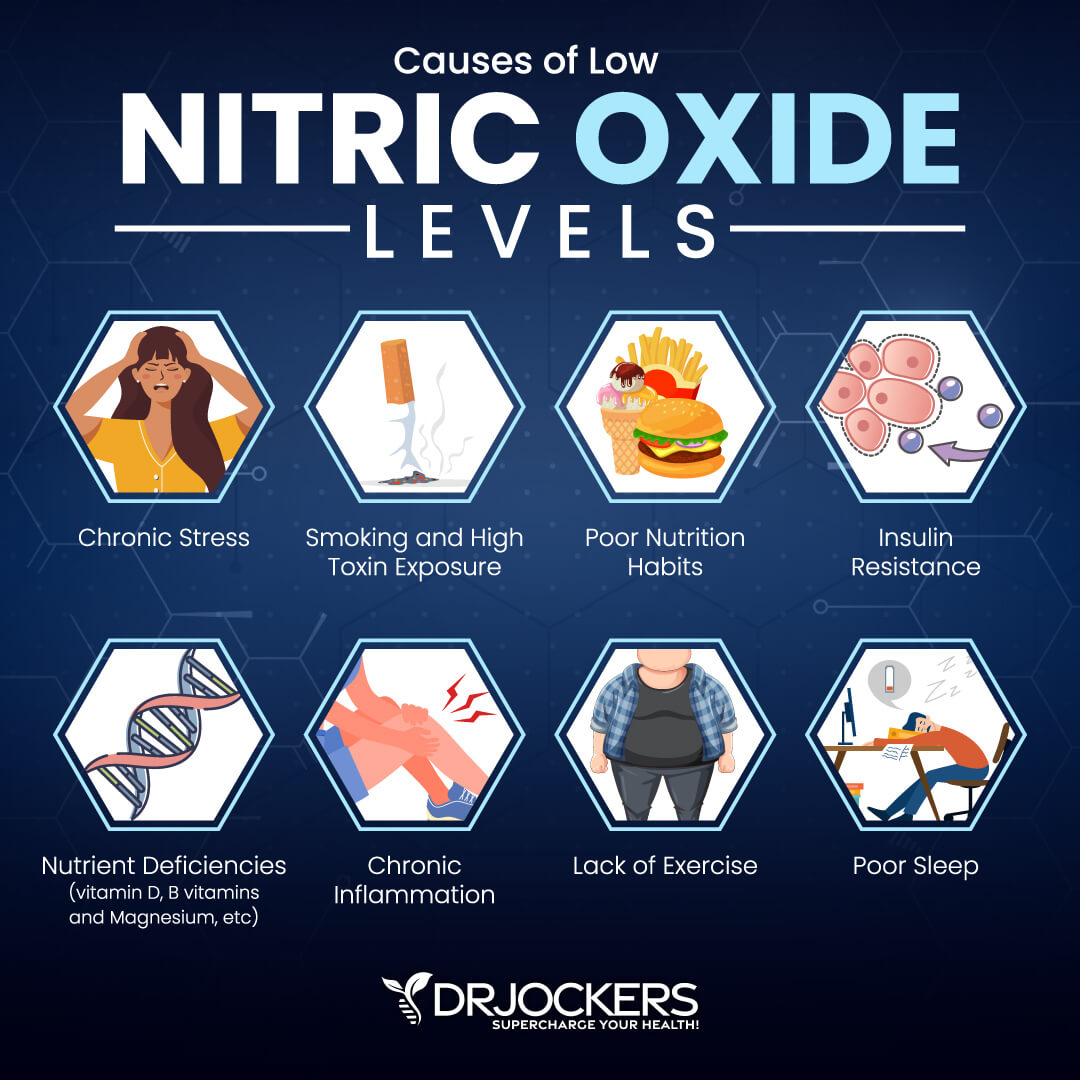
Strategies to Improve Nitric Oxide Levels
Most individuals can benefit from improving their nitric oxide levels. Since nitric oxide can reduce with age, if you are over the age of 40, you may particularly benefit from a nitric oxide boost. You may also particularly benefit from improving your nitric oxide levels if you have:
- Poor immune function
- Insulin resistance, type 2 diabetes, or metabolic syndrome
- Arthritis or chronic inflammatory conditions
- Fatigue or low energy
- Insomnia or sleep issues
- Brain fog, cognitive symptoms, or neurocognitive problems
- Erectile dysfunction
- Glaucoma
So let’s get into some specific tips on how to raise your NO levels naturally.
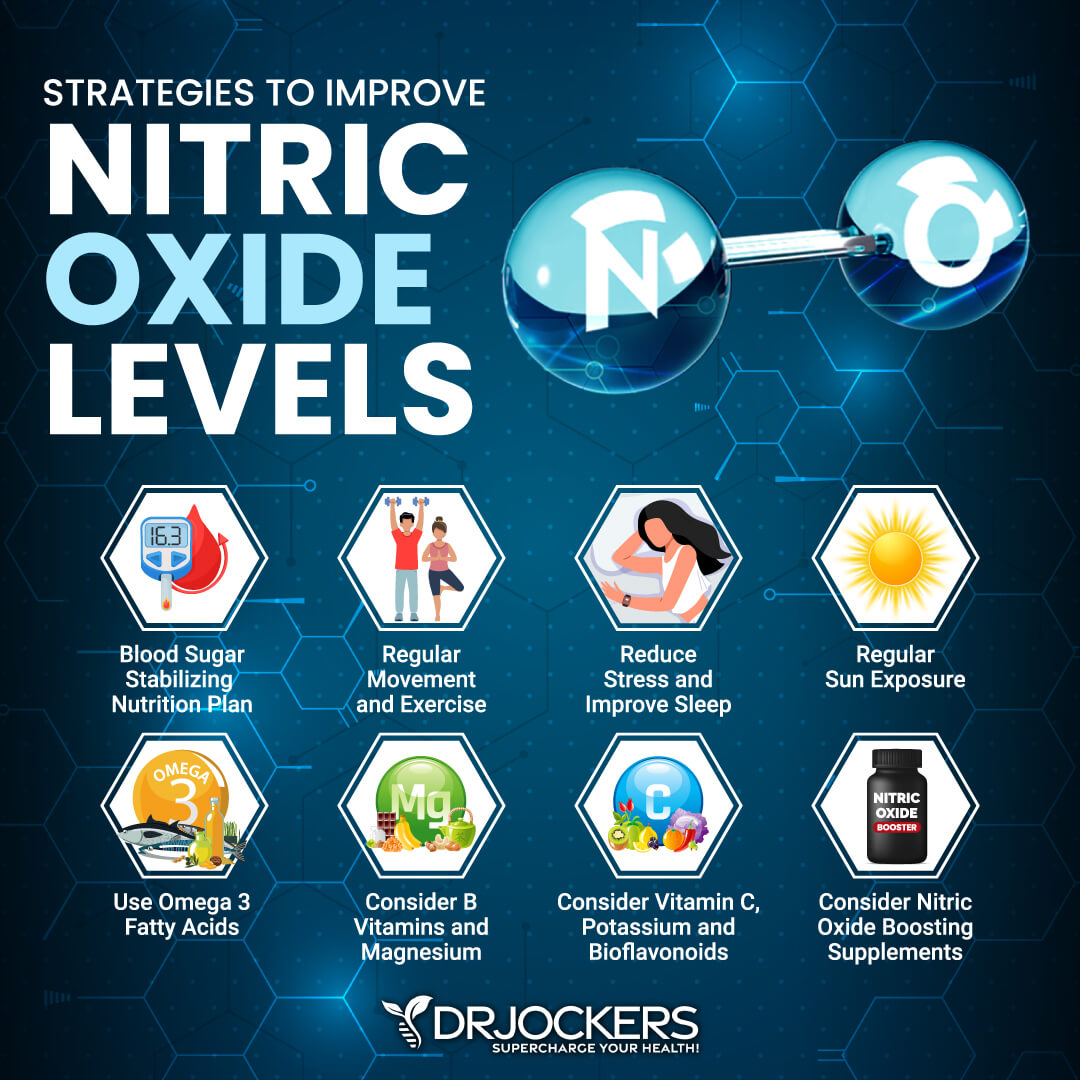
Blood Sugar-Stabilizing Nutrition Plan
Insulin resistance, type 2 diabetes, and metabolic syndrome are among the main risk factors for NO deficiency. Nitric oxide supplements are also commonly recommended for not only high blood pressure but diabetes as well.
According to a 2010 study published in Diabetes, NO synthesis is often decreased in people with type 2 diabetes and diabetic neuropathy (12). Improving insulin sensitivity and blood sugar balance may help to improve NO levels.
I recommend following a blood sugar-stabilizing nutrition plan. Remove inflammatory foods, such as sugar, artificial sweeteners, alcohol, caffeine, GMOs, trans and hydrogenated fats, artificial ingredients, high fructose corn syrup, and processed foods.
Eat lots of anti-inflammatory foods, such as greens, vegetables, sprouts, herbs, spices, low glycemic index fruits, nuts, seeds, grass-fed meat, pasture-raised poultry and eggs, wild-caught fish and seafood, and wild game. Reduce your sugar intake by focusing on low-carb and ketogenic principles.
Limit your carbs to low-glycemic index fruits and vegetables. Eat lots of healthy fats, including olives, olive oil, coconut oil, coconut meat, avocados, grass-fed butter and ghee, fatty fish, and other healthy animal fats.
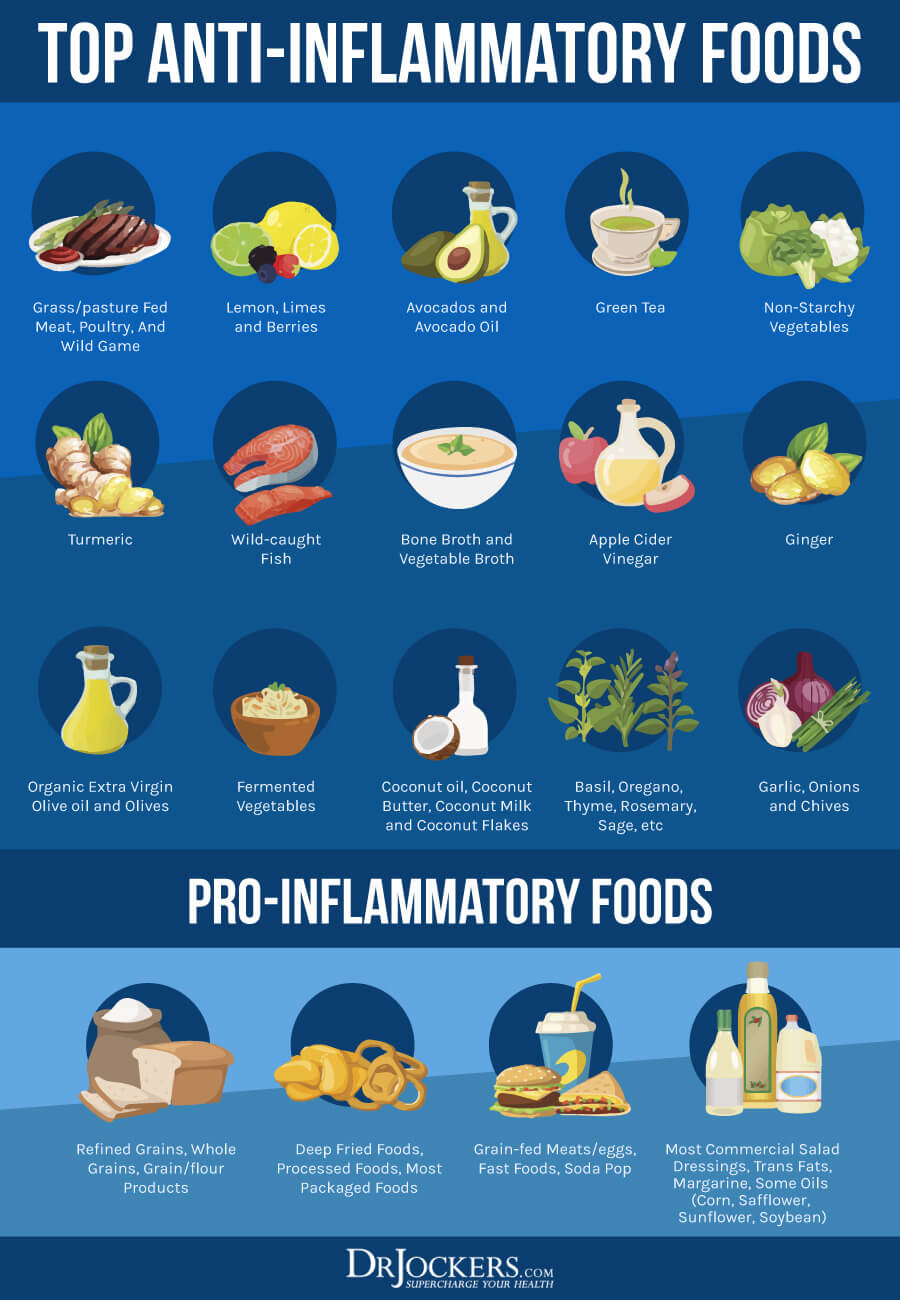
Consume Nitric Oxide Boosting Foods
Another way to increase your NO levels is by consuming nitric oxide-boosting foods. Let me start out by saying that there are no foods that are high in NO. However, some foods contain a good amount of nitrates, which are then converted into nitrites, then into nitric oxide. Most of your NO levels are supplied by vegetables.
Foods high in nitrates include:
- Red beets
- Arugula
- Bok Choy
- Chard
- Lettuce
- Spinach
- Endive
- Other leafy greens
- Broccoli
- Radishes
- Chinese cabbage
- Carrots
- Cauliflower
- Cucumber
- Leeks
- Fennel
- Turnips
- Parsley
- Dill
- Other herbs
- Oranges
- Bananas
- Pomegranate juice
Arginine may also help your body to create NO. Arginine is generally found in high-protein food.
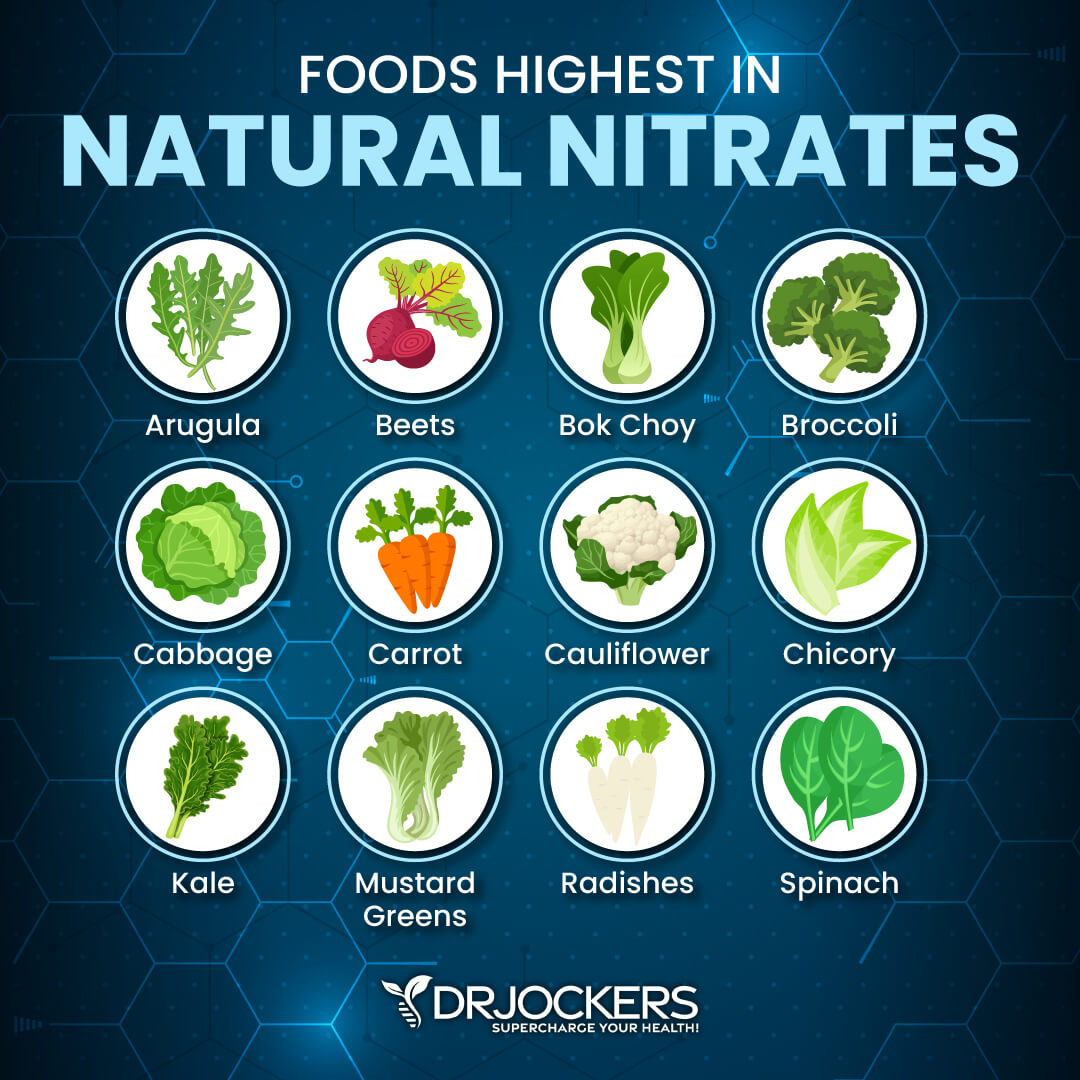
Foods High in Arginine Include:
- Grass-fed beef
- Wild-caught fish
- Pasture-raised, cage-free eggs
- Cultured yogurt
- Kefir
- Raw cheeses
- Pumpkin, sunflower, and other seeds
- Seaweed
- Spirulina
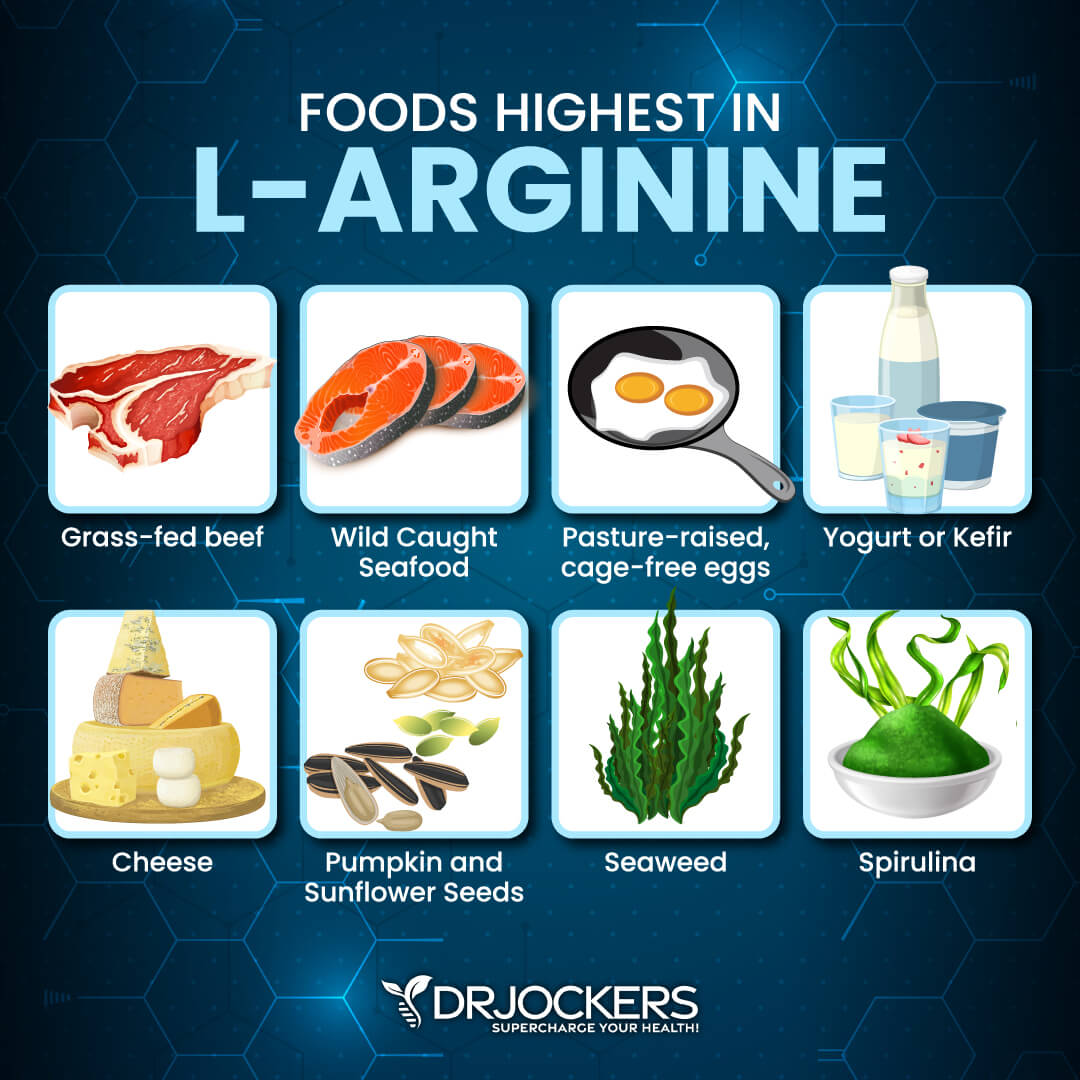
Regular Movement and Exercise
A sedentary lifestyle may also increase the risk of low nitric oxide levels. Not only can NO support athletic performance but exercise itself may support nitric oxide production.
According to a 2015 study published in Frontiers in Cellular and Developmental Biology, exercise may help to improve NO production and signaling pathways and improve health as a result (13). According to a 2017 research published in the Journal of Clinical Biochemistry and Nutrition, exercise may improve NO levels and blood pressure (14).
I recommend exercising regularly, at least 20 to 30 minutes 5 days a week. I recommend the combination of resistance training and cardiovascular exercise. Great ideas for resistance training and strength training include bodyweight exercise, free weight, weight machines, kettlebells, and TRX.
Good ideas for cardiovascular exercise include biking, swimming, trampoline workout, jogging, hiking, and dancing. High-intensity interval workouts (HIIT) and Tabata workouts combine cardio and resistance training within a short workout.
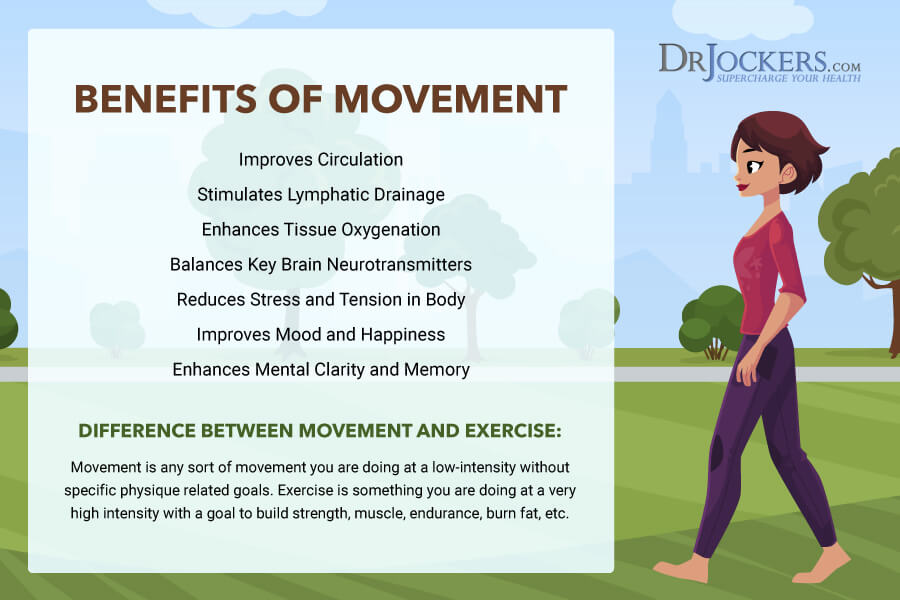
Reduce Stress and Improve Sleep
Chronic stress and poor sleep may also reduce nitric oxide levels. According to a 2017 review published in Vitamins and Hormones, nitric oxide may help to decrease stress-related anxiety (15). According to a 2010 study published in the Journal of Neuroscience, NO may support quality sleep (16).
I recommend reducing your stress levels and improving sleep. To decrease stress, I recommend practicing meditation, breathwork, guided relaxation, mindfulness, and gratitude. You may try journaling, prayer, spiritual practices, and movement. Work with a therapist, life coach, or spiritual counselor as needed.
Avoid heavy foods, sugar, alcohol, and stress in the evening. Also, avoid electronic use at least 2 to 3 hours before going to sleep. Choose relaxing activities, such as reading, journaling, crossword puzzles, jigsaw puzzles, coloring, listening to music, taking a bath, and calm family time. Sip on herbal tea. Ensure that you have a supportive and comfortable bed, bedding, and pillows. Support your sleep with blackout curtains and eye pillows. Keep electronics out of your bedroom.

Regular Sun Exposure
I also recommend regular sun exposure to improve your vitamin D levels and, as a result, nitric oxide production. Vitamin D and sunlight are powerful NO regulators. Without them, nitric oxide levels may decrease, which can increase cardiovascular and other health risks.
UVA is a type of ultraviolet (UV) radiation that makes up 95 percent of all the UV rays from the run. Vitamin D, UVA from the sun, and infrared light turns on nitric oxide production.
A 2014 animal study published in Molecular Endocrinology has found that vitamin D may help to regulate nitric oxide synthesis and improve arterial stiffness (17). According to a 2019 study published in Nutrients, vitamin D may help to increase nitric oxide-dependent vasodilatation (18).
I recommend getting some sunshine daily for 15 to 30 minutes, if possible. I also recommend using some infrared light and taking a daily dose of vitamin D supplements.
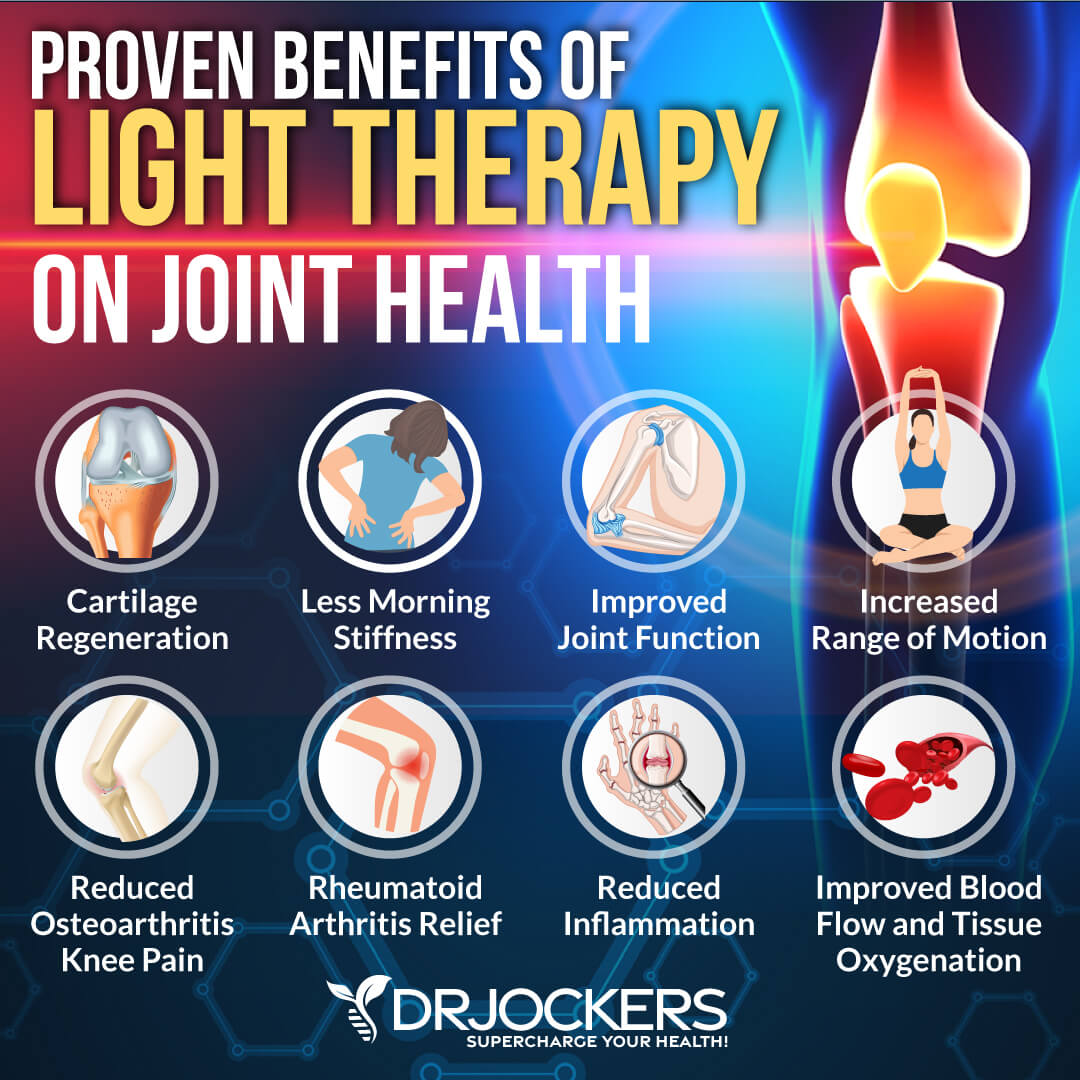
Use Omega-3 Fatty Acids
Using omega-3 fatty acids may be a great way to improve nitric oxide levels. According to a 2014 animal study published in Food & Function, using dietary fish oil supplements may help to improve NO synthase activity and may help to reduce oxidative stress in red blood cells in mice (19).
A 2022 study published in Nutrients has found that omega-3 fatty acids may help to improve nitric oxide production by increasing arginine levels in the blood (20). Arginine is an amino acid that plays a role in the production of nitric oxide.
According to the study, taking 3 grams of omega-3 supplements for 12 weeks help to improve the nitric oxide levels and, as a result, the endurance of athlete participants. To improve your nitric oxide levels, I recommend taking an omega-3 fish oil supplement daily and eating wild-caught fish rich in omega-3 fatty acids.
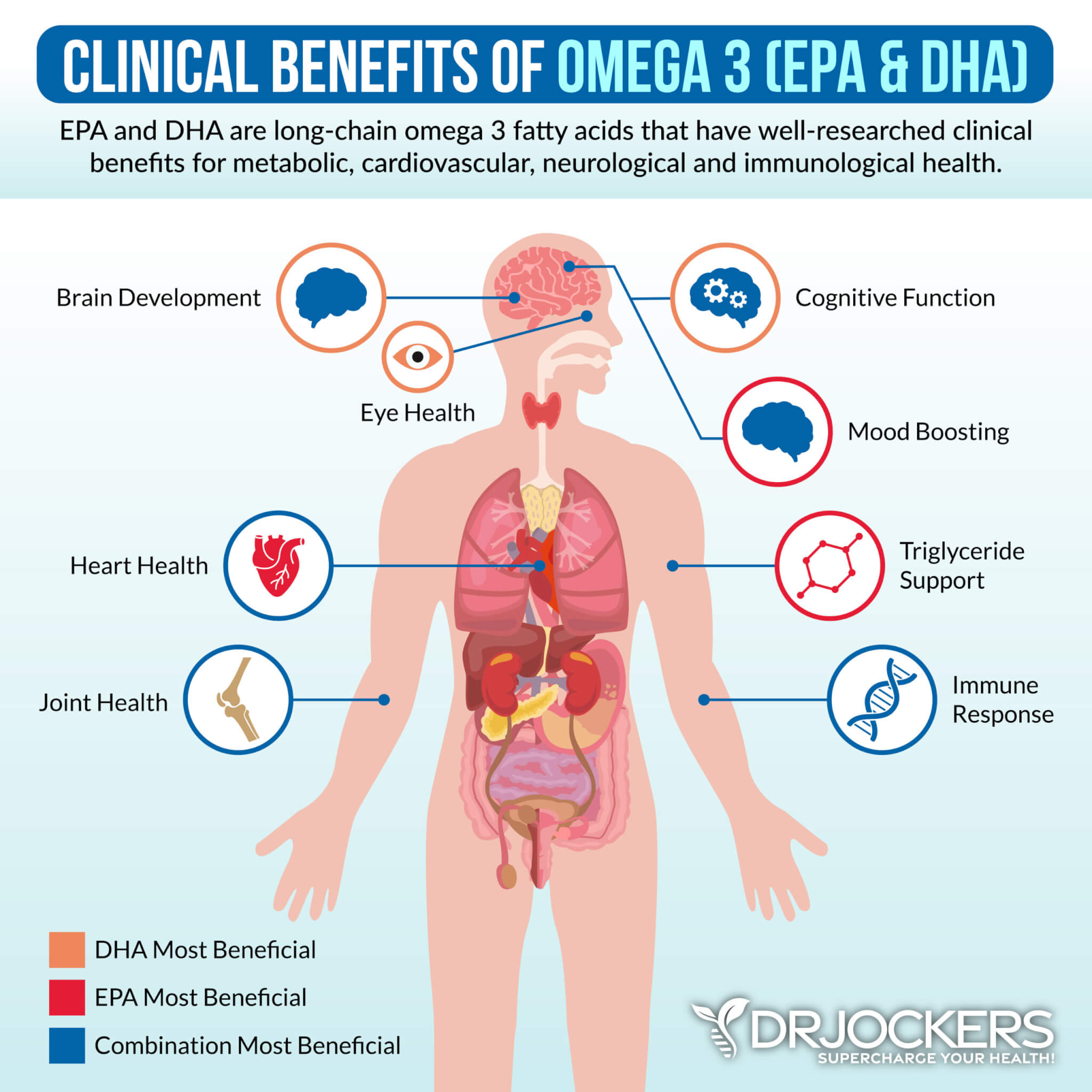
Consider B Vitamin Status and Magnesium
I also recommend improving your B vitamin and magnesium levels as these micronutrients may also play a role in nitric oxide levels. B vitamins may increase the production of nitric oxide by decreasing homocysteine levels in the blood.
Increased homocysteine levels may prohibit the arginine-nitric oxide pathway and decrease nitric oxide production. According to a 2016 study published in the European Journal of Nutrition, using B vitamins and arginine may help to improve nitric oxide levels and decrease blood pressure (21). Within the B vitamin group, folate, B12, and B1 are particularly important.
Moreover, according to a 2020 research published in Cureus, taking too much nitric oxide may reduce vitamin B12 levels (22). So it’s important that you supplement with vitamin B12 even if you are taking nitric oxide or improving your nitric oxide levels otherwise to avoid vitamin B12 deficiencies.
Besides B vitamins, magnesium may also be a great option for better nitric oxide levels. According to a 2011 review published in The Journal of Clinical Hypertension, magnesium may be a natural calcium channel blocker, may improve nitric oxide, may increase endothelial dysfunction, and trigger both direct and indirect vasodilation (23). I recommend taking a vitamin B complex, vitamin B12, and magnesium as a supplement to improve your nitric oxide levels.
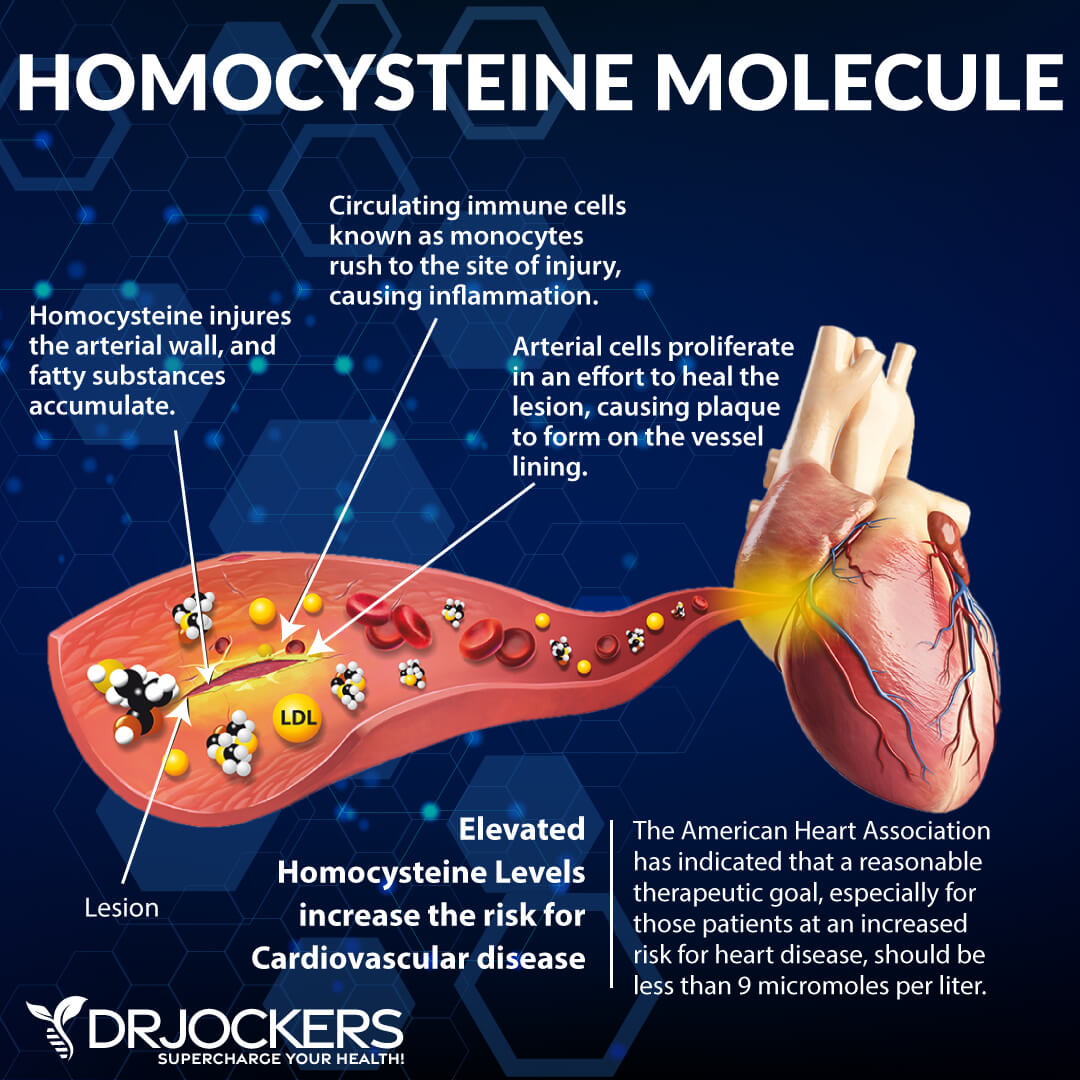
Consider Potassium, Vitamin C, and Bioflavonoids
I also recommend considering potassium, vitamin C, and bioflavonoids for improved nitric oxide levels. According to a 2009 research published in The Proceedings of the National Academy of Sciences of the United States of America, nitric oxide may help to soften the vascular endothelium (24).
It may also help to improve nitric oxide release. Thus it may also help to improve blood pressure. I recommend eating potassium-rich foods, such as bananas, spinach, broccoli, avocados, and beet greens, and taking potassium supplements as needed.
According to a 2014 study published in Nitric Oxide, vitamin C may help to improve the bioavailability of nitric oxide (25). This happens by vitamin C “either helps to reduce oxidized BH₄ or prevent BH₄ from becoming oxidized in the first place,” or it may “increase eNOS activity by changing its phosphorylation and S-nitrosylation status or by upregulating eNOS expression” (25).
This may help endothelial function. I recommend eating food rich in vitamin C, such as citrus, strawberries, pineapple, broccoli, and bell pepper, and using vitamin C supplementation.
According to a 2014 research published in Food and Function, bioflavonoids may also help to improve nitric oxide levels by increasing the synthesis and bioavailability of nitric oxide (26). They may also reduce superoxide-induced nitric oxide inactivation and eNOS uncoupling.
I recommend eating bioflavonoid-rich foods, such as celery, parsley, peppers, berries, pomegranates, grapes, citrus fruits, plums, onions, leeks, Brussels sprouts, kale, broccoli, tea, beans, apples, and various herbs, and using bioflavonoids as supplements.
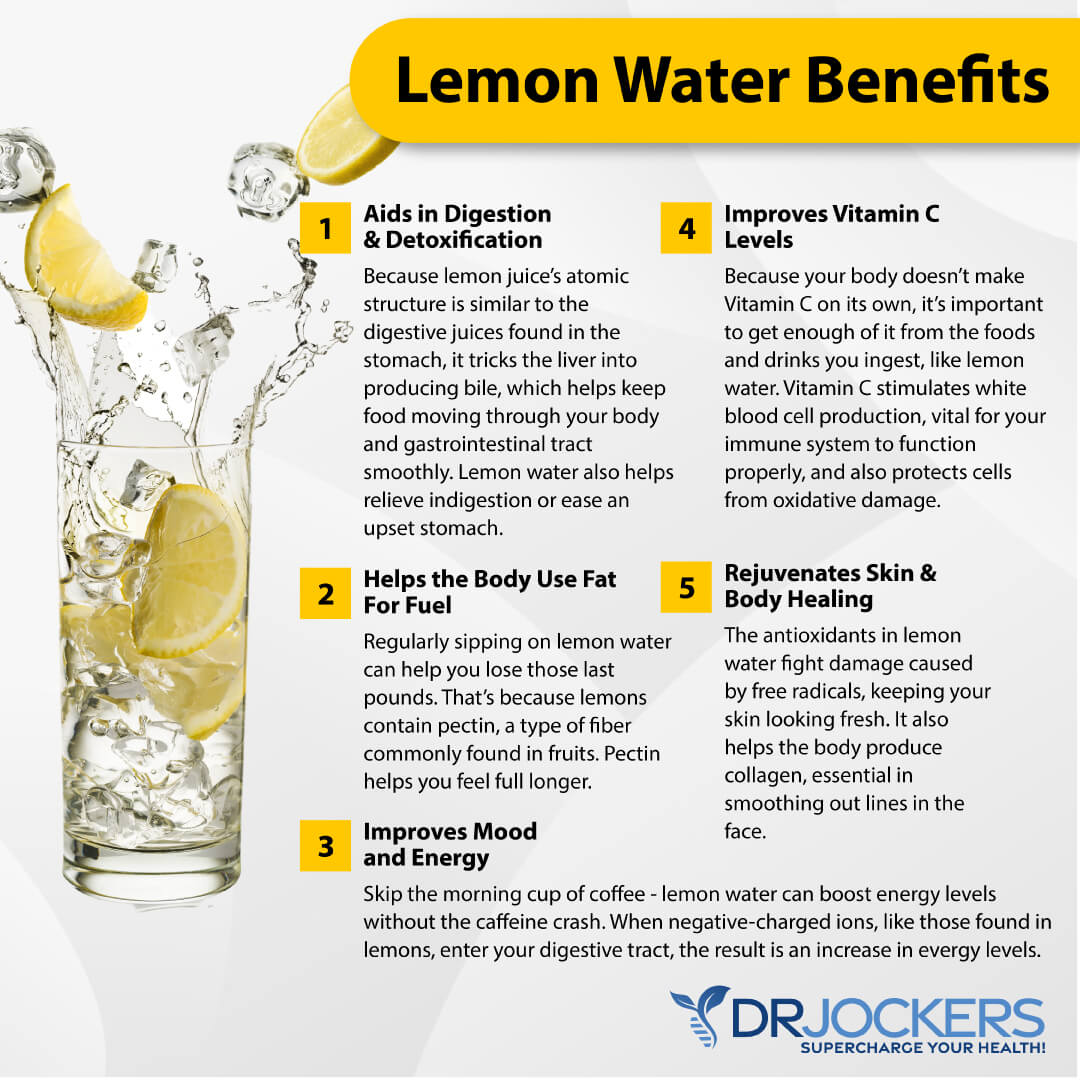
Nitric Oxide Supplements
You may also consider some supplements for nitric oxide levels. Here are some options:
Beet Supplements
According to a 2018 study published in PLoS One, using beetroot juice may help to increase nitric oxide (27). Besides juices, you may also use beet as a capsule or powder. Beet supplements tend to work well. But they are also high in oxalates, so they are not a great option if you have oxalate sensitivity or many food intolerances or sensitivities.
Arugula Supplements
According to a 2013 study published in the British Journal of Clinical Pharmacology, nitrates in leafy greens and beets may help to improve nitric oxide levels and vascular function (28). Arugula supplements are also great.
Arugula, as some other greens, is a rich source of nitrates that convert to nitric oxide when eaten. You may also use it as a supplement. They are also a low oxalate form of nitrates.
L-Arginine Supplements
According to a 2016 study published in the European Journal of Nutrition, using L-arginine may help to improve nitric oxide levels and decrease blood pressure (21). L-arginine may help to improve high blood pressure, erectile dysfunction, and angina. However, L-arginine is not very effective in people over 40 and can increase viral activity in the body.
Potassium Nitrate:
This is a very effective form of nitrates and potassium to improve NO levels and support healthy blood pressure and circulation. One of the best ingredients to look for in a good NO supplement.
Citrus Bioflavonoids (Hesperidin):
Citrus bioflavonoids work very effectively to reduce endothelial inflammation, improve NO levels and support healthy circulation. This works even better when combined with vitamin C, potassium and magnesium.
Magnesium:
Magnesium is one of the most important ingredients to support NO levels and reduce endothelial inflammation and support vasodilation and healthy blood pressure levels.
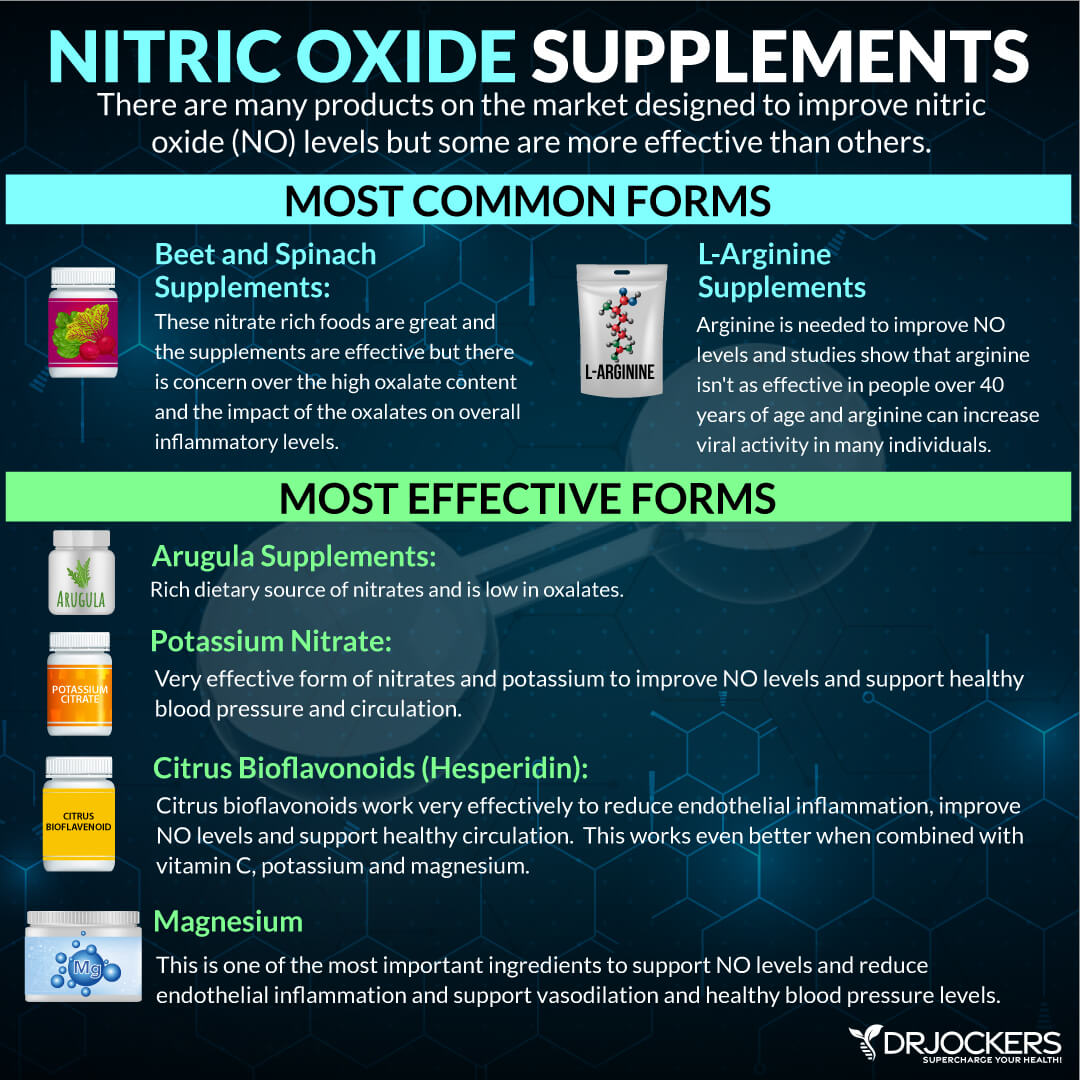
Introducing Nitric Oxide Powder
Recommend using Nitric Oxide Powder. It is oxalate free and utilizes MTHF for those who genetically have trouble converting dietary nitrate. It supports healthy blood pressure, normal circulation, sexual health, cognition, brain health, and immunity.
This formulation stimulates NO production without the use of arginine, beetroot, or spinach. It contains arugula extracts, potassium nitrate, vitamin C, citrus bioflavonids and magnesium. This formulation also utilizes L-5-MTHF (methyltetrahydrofolate) for those who genetically have trouble converting dietary nitrate.
The most reliable way to know if your levels of NO are insufficient is to use the 10-second test strip. Then take 2 capsules of Nitric Oxide Power and re-test in 90 minutes. Hydrate before and after. You may notice increased thirst while taking the supplements.
Any test strips for N-O are recommended. Always consult your trusted health professional before using this supplement. This supplement is not intended for pregnant or nursing women.
Final Thoughts
Nitric oxide is a powerful mediator in cell-to-cell communication and plays an essential function in various bodily processes, including inflammation, neurotransmission, and validation. It may help to improve your health in various ways. I recommend following my top strategies to increase your nitric oxide levels naturally.
If you want to work with a functional health coach, I recommend this article with tips on how to find a great coach. Our website offers long-distance functional health coaching programs with our world-class team of health coaches. For further support with your health and other goals, just reach out—our fantastic coaches are here to support your journey.
Inflammation Crushing Ebundle
The Inflammation Crushing Ebundle is designed to help you improve your brain, liver, immune system and discover the healing strategies, foods and recipes to burn fat, reduce inflammation and Thrive in Life!
As a doctor of natural medicine, I have spent the past 20 years studying the best healing strategies and worked with hundreds of coaching clients, helping them overcome chronic health conditions and optimize their overall health.
In our Inflammation Crushing Ebundle, I have put together my very best strategies to reduce inflammation and optimize your healing potential. Take a look at what you will get inside these valuable guides below!
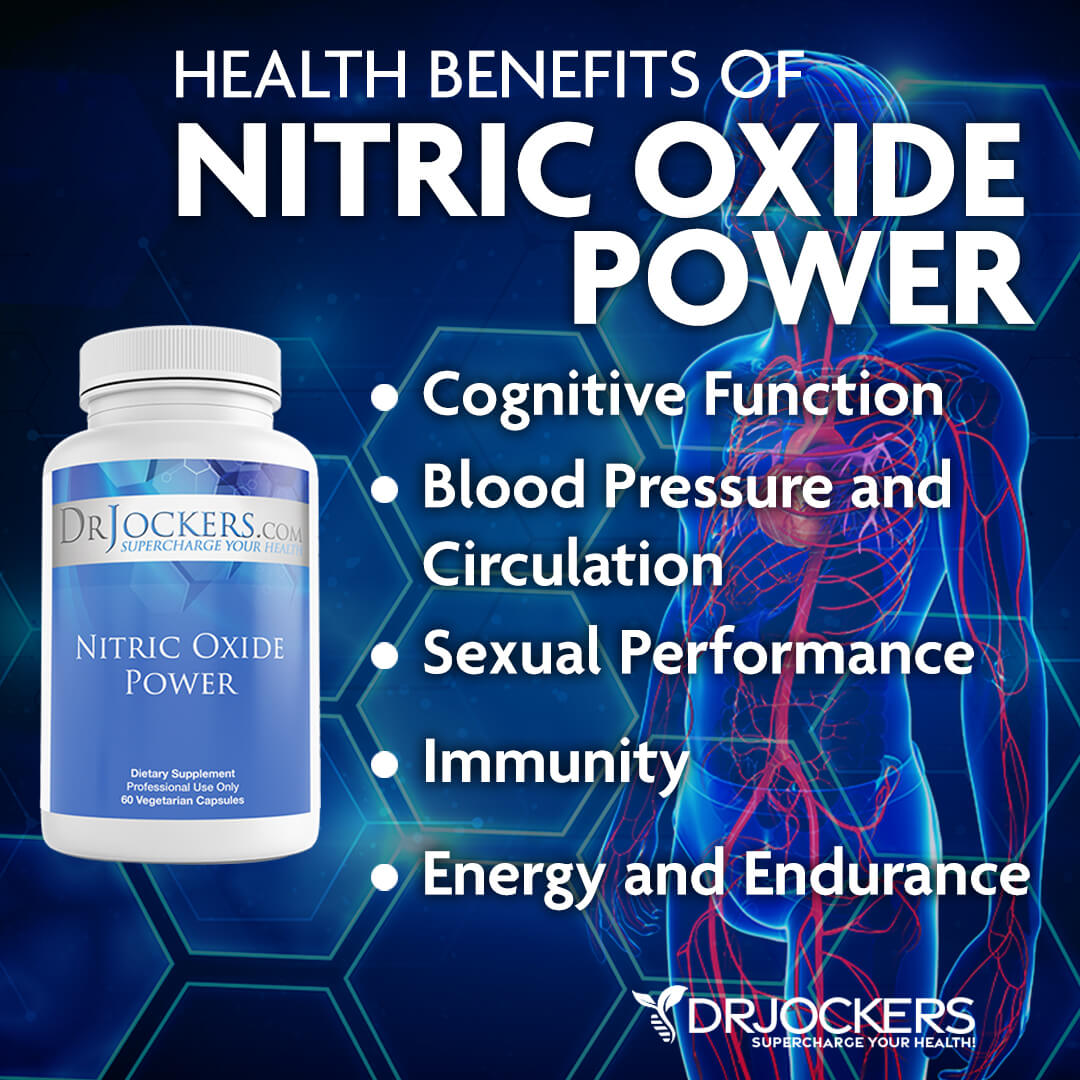




Your regular emails are so well researched, so attractively laid out and easy to comprehend, I find I’m saving most all of them to my Jockers folder.
I’m especially interested in self-care, and ways to avoid the medical system.
Just started getting these, but find them most valuable!
Thanks!!
Your articles are the most thorough, science based, and well researched that I’ve seen. Thank you for the good info